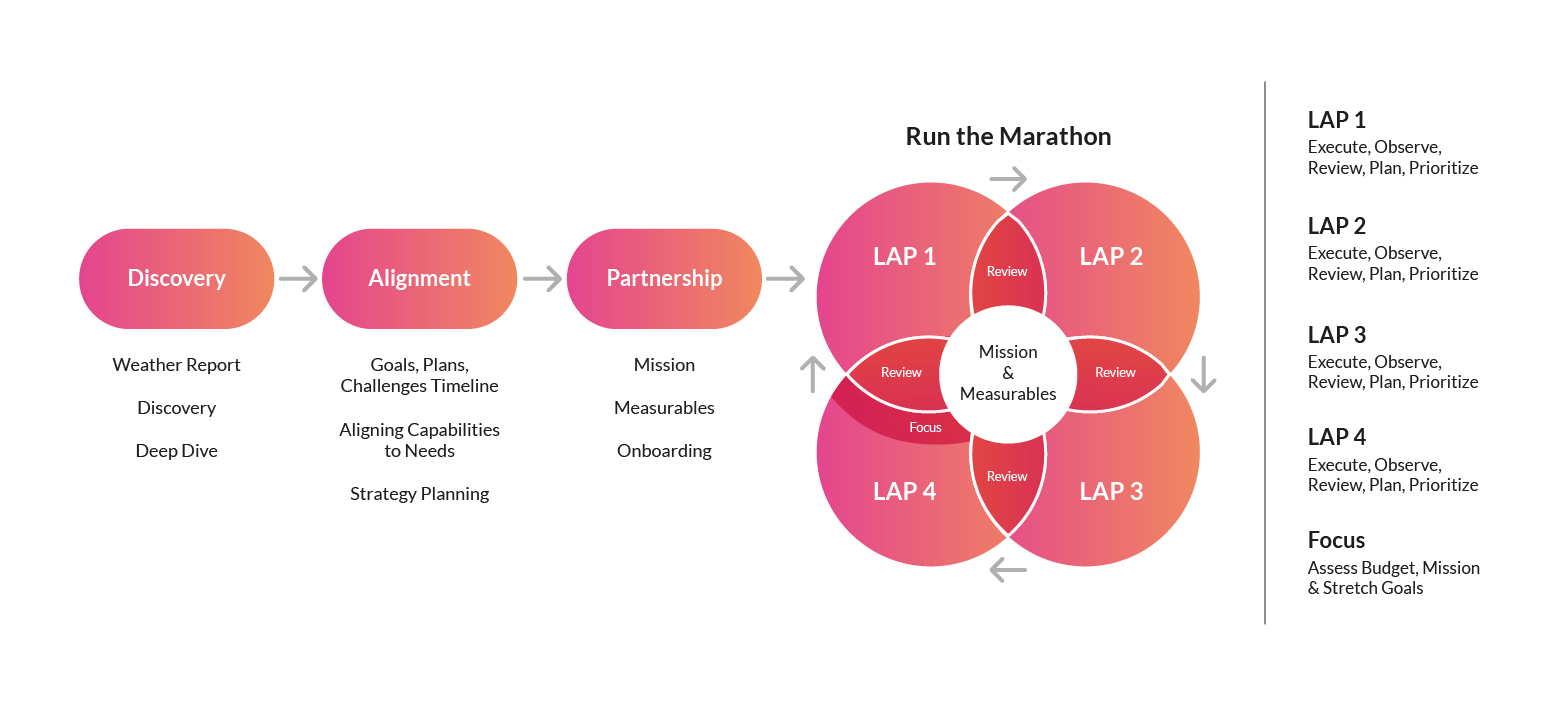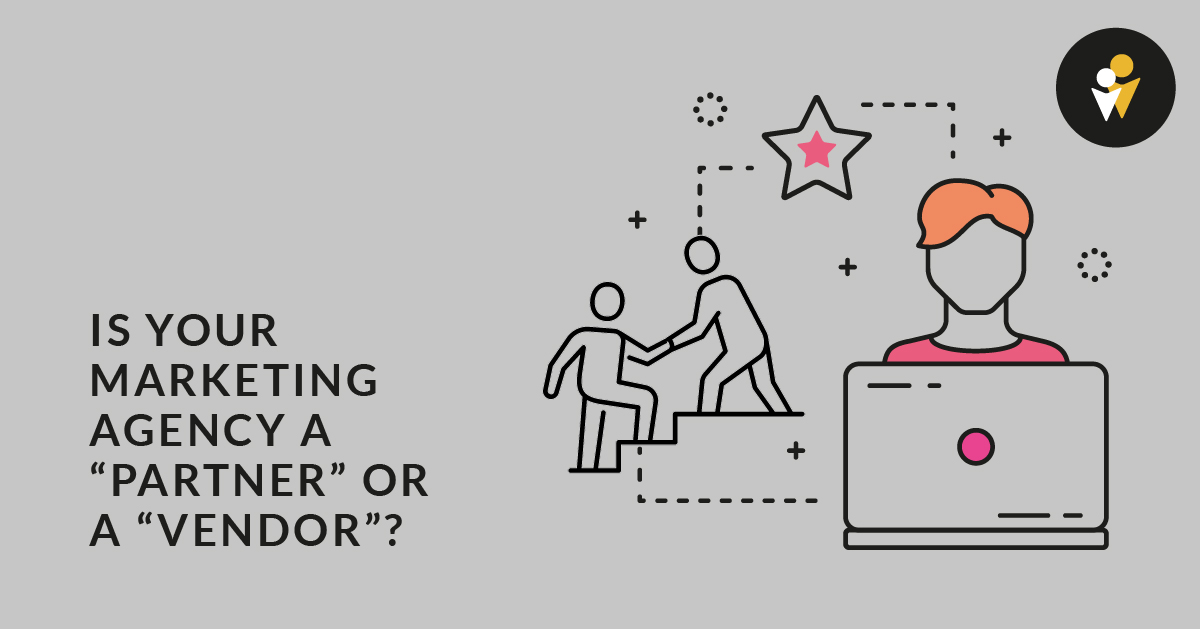When you hire a marketing agency, are you seeking a "vendor" or a "partner"? It's an important distinction. Understanding the differences and knowing which type of relationship is best for your business will help you select an agency whose vision and mode of operation match your needs, minimizing friction and increasing the likelihood of a successful long-term alliance.
Vendor vs. Partner
Your company website needs an overhaul. The current site was launched three years ago, and its age is evident. It looks outdated, the navigation is less than intuitive, and because the underlying technology is no longer cutting edge, even simple content changes take your in-house designer hours to complete. What’s your next step?
The traditional answer to that question is, “Start searching for a website designer or marketing agency to build a new site.” It’s a process you have gone through before, and while it is not something you look forward to, you are resigned to the belief that it’s just something you must do every two or three years.
Marketing Agency as a Vendor
Maybe you already have a relationship with a marketing agency and call on them when needed: a trade show display, new marketing brochure, logo’d swag, etc. Perhaps they designed and developed your current site, and now they are encouraging you to update your online presence. You call your agency contact, schedule a meeting, and begin the tedious process of re-thinking your website, striving to land on a structure and look that will get you through the next few years.
Alternatively, if you do not have an existing agency relationship or if price and production time are your priorities, you may reach out to multiple website design companies or marketing agencies for proposals. If this project goes well, maybe you’ll find an agency that can help you with future design projects when you need them.
The scenario described above has been the norm in the marketing world for decades, and it’s descriptive of a business viewing their agency as a vendor. Marketing agencies that view themselves as a vendor are often labeled as a “Paintbrush Agency.” Why? Because the agency will operate in much that same way as a paintbrush. A paintbrush is wielded and only does as directed. The painter—the agency’s designer—hopes to use the paintbrush to create a masterpiece that will last for years, based on your direction. When the website or brochure is done, it’s done, until you reach out again to request the next update.
When you view your marketing agency as a vendor, you (and the agency) treat each task as a standalone project, initiated and completed according to your direction. Time spent discussing your business, the markets you serve, your objectives, etc. are typically project-specific, rather than wholistic, long-term, and strategic. The vendor agency’s objective is to complete the task at hand and move on to the next project, placing the burden of project or marketing initiative evaluation on you and your team.
Do you have the tools and in-house expertise to evaluate your new website’s performance? Are you equipped to record each website visitor’s experience and visually represent how users scroll, click, and navigate your new website? How are visitors finding your site? Are you attracting enough traffic? Is it the right kind of traffic to produce quality sales leads? How easily can you update your site’s content and site map?
Do you have a clearly defined ideal customer profile (your hero)? Does your content address your hero’s needs (their mission), or is it more focused on selling your solution? Is your content reaching prospective customers, and delivering value, at each stage of the buyer’s journey? Does your marketing agency have a clear understanding of and alignment with your businesses hero(es) and their missions?
These questions—and many others—highlight the shortfalls of “jobbing out” your important marketing projects to a vendor or paintbrush agency.
Marketing Agency as a Partner
A partner agency’s approach is very different from that of a vendor agency, and the difference is evident from the questions commonly asked in the initial conversation:
Vendor Agency |
Partner Agency |
| Do you know what you’re looking for in a new website/brochure/tradeshow booth/etc.? | Tell me about your business, solution(s), and industries served. |
| Do you have a budget? | How are you marketing your business today? |
| What is your timeframe for this project? | What do you feel is working best? Least? |
| Who will be our primary point-of-contact for the project? | Why do you feel you need a new website/brochure/tradeshow booth/etc.? |
|
|
Who is your audience, your ideal customer profile (ICP)? |
|
|
What information is each of your ICP looking to obtain from your website? |
|
|
What are your marketing objectives for this project? How will you know if it is successful? What is your long-term (3-5 years) vision for your business? What are “the metrics that matter” to accurately evaluate the effectiveness of your marketing efforts? What are the gaps between what your in-house marketing team can do versus what you need? How can we best fill those gaps? |
A partner agency is typically more invested in your long-term vision and, therefore, will take more time at the start of the relationship to understand your objectives and ICP. The marketing partner will work closely with your marketing, sales, customer success, and leadership teams to discuss and agree on an appropriate, long-term marketing strategy and KPIs, ensuring that all parties involved agree that your goals are reasonable and attainable.
Unlike a vendor agency that’s focused on completing projects, a partner agency shares the responsibility for your business’s marketing success, so close collaboration is critical. A good marketing partner is available to assist and respond to critical requests on demand. A true partner will not over promise, honors commitments, and emphasizes frequent, consistent, and honest communication.
PIC’s Walk With You Marketing process, for example, illustrates a marketing partnership dedicated to effective planning, data-driven evaluation, consistent communication, and continuous improvement:

Which Is Right for You: Vendor or Partner?
Vendor agencies and partner agencies can deliver value. So how do you know which type of relationship is most appropriate for your business?
If you already have a fully staffed marketing department—meaning marketing strategy and operations are covered—you may not need the strategic, planning, and consultative services of a partner agency. Hiring a vendor to design and produce what the marketing team specifies may be exactly what you need. But if your marketing team is relatively small and can benefit from experienced marketing leadership, strategic planning, and tactical assistance, then seeking a partner agency to invest in your long-term growth objectives is the right move.
Most business owners recognize the importance of effective marketing. That doesn’t mean they are will or able to hire a large marketing team. It’s not uncommon for a small- or medium-sized business to have a marketing team of one person who feels responsible for “doing it all.” Unfortunately, that employee’s time is spent on tactical work, with no or limited time to develop a long-term growth strategy or the skills and resources to carry it out alone. A good partner agency will offer expertise in a range of marketing disciplines and can deliver the services you need when you need them as part of an agreed-upon strategy and plan:
- Strategy development
- Branding
- Website design & development, eCommerce solutions
- Graphic design
- Content & copywriting
- Lead generation—Inbound marketing, ABM consulting
- Social media marketing
- SEO/SEM
- Email marketing
- Content management & CRM systems
KEY POINT: A partner agency expects to have and works hard to maintain a collaborative relationship based on achieving a long-term vision and executing on a documented marketing plan. It’s important that you and your team are sold on that approach and treat the agency’s team more as co-workers or peers, rather than an on-demand marketing services vendor.
The Wrap-up
Are you comfortable working on your own with a traditional vendor agency that follows your directions and delivers on demand? Or will you be more effective and less stressed if you’re in charge but supported by a team of marketing experts who view themselves as your partners seeking the same objectives? Here’s a short questionnaire to help guide you to the correct decision:
|
Question |
Yes |
No |
| 1. Is your marketing team able to accurately communicate what your business needs to market itself effectively and then implement and manage resources provided?
If you answer “Yes,” your business may be the perfect match for a traditional vendor (“paintbrush”) agency. Your marketing team knows exactly what it needs to succeed, can communicate those needs to agency designers and writers, and then implement the resources the agency provides. |
|
|
| 2. Is your business currently meeting its growth objectives? |
|
|
|
3. Are your current marketing efforts providing a sufficient volume of qualified leads to your sales team? Answering “No” to Questions #2 or #3 puts your business in the majority. It’s very possible that you are falling short of growth objectives and your sales team is complaining about a love volume of good leads because of ineffective marketing. |
|
|
|
4. Does your current marketing team include skilled specialists to lead critical marketing disciplines: website, content, social, search engine optimization, paid search, etc.? “Yes” may mean that your business is fully staffed and ready to self-perform, perhaps with the help of a vendor agency. However, if you answered “Yes” here but “No” to question 2, 3, 6, or 7, you may be able to benefit from a growth-oriented partner agency that takes a wholistic view of your marketing and sales operation and helps you receive more value from the team you’ve already built. |
|
|
|
5. Does your business have at least one employee dedicated full-time to marketing and lead generation? If yes, how many: _____ If you answered “No” to this question, you are an ideal candidate for a partner agency. You’re much more likely to meet your growth objectives if you obtain assistance from a full-service, growth-oriented marketing firm that will supplement and guide your current marketing resource(s) or even serve as your business’s marketing department. |
|
|
|
6. Are you able to confidently calculate the ROI of your marketing channels and campaigns? Being able to accurately measure the ROI of your marketing initiatives is the only way to know that you’re investing your time and money wisely, so an answer of “No” to this question is a signal that you should seek some assistance. Look for a full-service marketing consultancy that recognizes the value of marketing analytics and will help you establish the reporting foundation you need to determine where your marketing investment is paying positive dividends. |
|
|
|
7. Are your marketing and sales teams aligned in their efforts to achieve growth objectives? Answer “No” to this one and know that you are not alone. Only a small minority of businesses report that their marketing and sales teams operate with a high level of alignment. It’s also common knowledge that businesses with well-aligned marketing and sales efforts are very frequently top performers in their respective industry. If your teams are not aligned, establish a partnership with a marketing agency that looks at and understands the big picture and can work directly with your team to implement processes and tools that transform your separate marketing and sales operations into one team operating in concert to drive business growth. |
|
|
|
8. Are you comfortable placing a high level of trust in your marketing agency, working together to develop an effective marketing plan, collaborating on plan execution, and staying the course until performance metrics direct otherwise? A “yes” answer means you are well suited for a partner agency. If you answered “No,” preferring to direct your agency to develop resources and change direction on-demand, then you’re looking for a vendor-type or paintbrush agency that is eagerly anticipating your next directive. On-demand relationships are often frustrating for partner agencies, as they perform most effectively when the strategy is clear, the plan is documented, the relationship is collaborative, and changes are metrics-based. |
|
|













